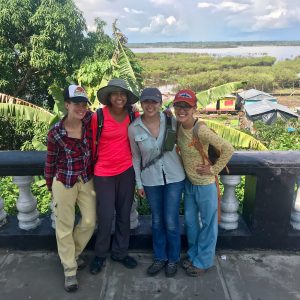WE ARE DRIVING THE PUBLIC GOOD
As a leading global public university, our mission is to serve the people of Washington and the world. We promote equity and social mobility by educating promising students from a wide range of backgrounds and supporting our community through partnerships and alignments that support real change — in schools, social services, businesses and policies that improve the health and well-being of all people. Your support of the campaign has fueled community initiatives, programs and research projects, providing a forum for ideas, ideals and actions that impact the greater global good.
THE PURPOSEFUL TRAVELER
When Morgan Busse, DNP ‘20, arrived in Iquitos with her two small children in tow, it was hot and humid and dusty. The Peruvian city was loud, full of taxis and construction.

“I’ve traveled a lot,” says Busse. “But I felt very, very foreign.”
It was 2018, and Busse — just embarking on a nursing practicum hosted by the UW Center for Global Health Nursing — had 10 weeks to engage in two important projects. The first project was a health-related intervention underway in the Claverito neighborhood of Iquitos.
At the time of Busse’s visit, the intervention was in its second year. The collaborative involved in the project had started to make environmental improvements, such as the creation of a staircase to navigate a steep hill and the development of household gardens filled with fresh vegetables and medicinal plants. For two weeks, Busse went door to door to gather health data on community members in order to gauge the clinical impact of the improvements. She measured patients’ hemoglobin, blood pressure, heart rate, weight and other health indicators.
As for the second project? Busse and a fellow nursing student, Marissa Masihdas, designed it themselves. Inspired by an early childhood and parenting development program created in South Seattle, the two adapted it for residents of Claverito.
Their first step was to reach out to local families. “We went to the community and asked them what their biggest challenges were and what they wanted to learn about,” says Busse. As it happens, the parents wanted to know more about diarrhea, an illness that afflicted many of their children.
Busse enlisted the help of Carmen Diaz, the dean of the Nursing School at the Universidad Nacional de la Amazonía Peruana, and her students. Together, the group held community classes on diarrhea prevention, cemented the concepts by conducting home visits, and handed out laminated recipe cards for families to keep. The cards illustrated the creation of homemade oral-rehydration solution, as well as information on water purification and storage.
There’s no doubt that Busse’s life was changed by her experiences during her 10–week stay, and she attributes her progress to having received the Barbara Wyman Fund for Global Nursing from the UW School of Nursing. Donor Jeb Wyman and his sisters created the fund to remember their mother: nurse and adventurer Barbara Wyman.
“We wanted to give students an opportunity to see other places, to recognize the enormous material privilege we have in this country,” says Wyman, a professor at Seattle Central College. “Students have transformative experiences, you know, and it changes their lives and their priorities.
Barbara Wyman first felt the call of international nursing when she was 20, delivering immunizations and providing relief from parasitic infections in Tlapacoyan, Mexico. Years later, she would act as a volunteer nurse in Nepal and Namibia and as an English teacher in Bangladesh, among other service-based travel.
Just as Barbara’s trip to Mexico in 1953 helped solidify a lifelong commitment to service, the Wyman-funded journey to Peru left an indelible mark on Busse.
“There are so many inequities in Iquitos,” she says. “And then coming back to the United States — the trip really highlighted the stigma and bias in our healthcare system.”
Now in a residency at a community health center, Busse intends to conduct a health intervention with the predominantly Spanish-speaking residents of Seattle’s South Park neighborhood.
“Nurses can take the lessons we’ve learned from global health work and apply them in our communities,” she says. “We are resilient, we can overcome a lot of barriers, and we can really help elevate the voices of marginalized people.”